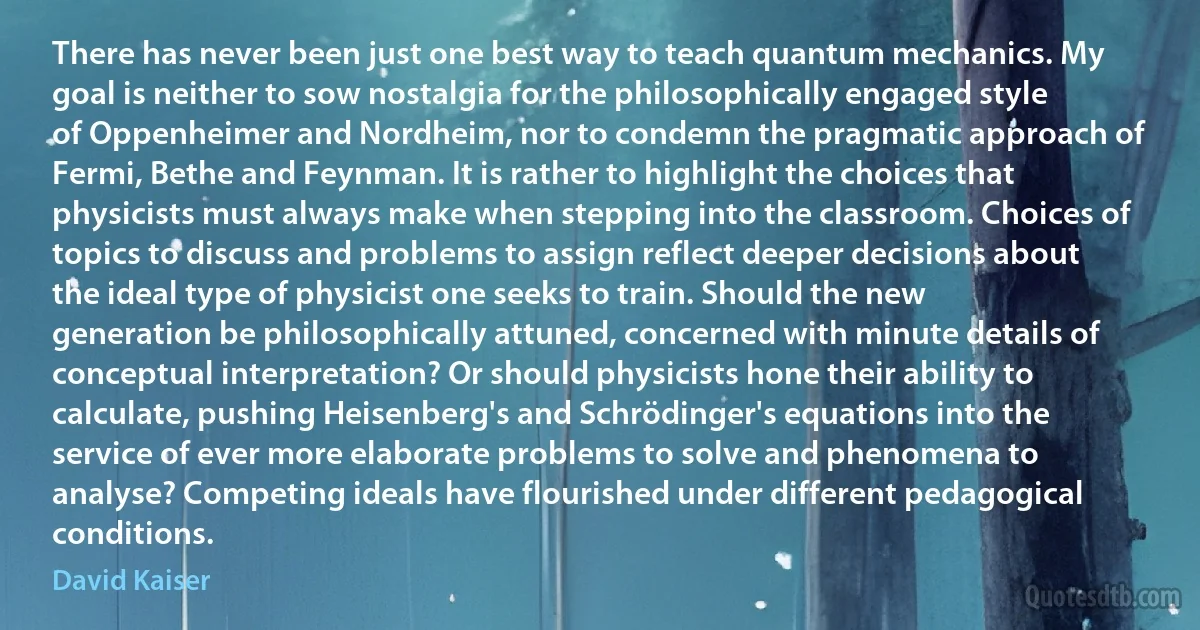
There has never been just one best way to teach quantum mechanics. My goal is neither to sow nostalgia for the philosophically engaged style of Oppenheimer and Nordheim, nor to condemn the pragmatic approach of Fermi, Bethe and Feynman. It is rather to highlight the choices that physicists must always make when stepping into the classroom. Choices of topics to discuss and problems to assign reflect deeper decisions about the ideal type of physicist one seeks to train. Should the new generation be philosophically attuned, concerned with minute details of conceptual interpretation? Or should physicists hone their ability to calculate, pushing Heisenberg's and Schrödinger's equations into the service of ever more elaborate problems to solve and phenomena to analyse? Competing ideals have flourished under different pedagogical conditions.
David KaiserRelated topics
ability analyse approach assign best different generation hone interpretation mechanics minute nor nostalgia physicist pragmatic quantum service should sow teach train under way highlight feynmanRelated quotes
In the spring of 1951 Churchman and I accepted appointments to (then) Case Institute of Technology in Cleveland because Case was committed to establishing an activity in Operations Research and Churchman and I had come to believe we could probably work better under this name than under the cloak of academic philosophy. By the end of 1952 we had formal approval, but not without faculty opposition, for the first doctoral program in Operations Research. From then on the Group and the program grew rapidly and flourished. Case became a mecca to which pilgrimages of operations researchers from around the world came. In 1958, Churchman, for personal reasons, migrated to the University of California at Berkeley where he established a similar activity. Academic Operations Research activities began to proliferate and flourish, many of them modeled on those at Case.

Russell L. Ackoff
For if experience has ever taught a truth, it is that a plurality in the supreme Executive will forever split into discordant factions, distract the nation, annihilate its energies, and force the nation to rally under a single head, generally an usurper. We have, I think, fallen on the happiest of all modes of constituting the Executive, that of easing and aiding our President, by permitting him to choose Secretaries of State, of Finance, of War, and of the Navy, with whom he may advise, either separately or all together, and remedy their divisions by adopting or controlling their opinions at his discretion; this saves the nation from the evils of a divided will, and secures to it a steady march in the systematic course which the President may have adopted for that of his administration.

Thomas Jefferson
Justice is the end of government. It is the end of civil society. It ever has been, and ever will be, pursued, until it be obtained, or until liberty be lost in the pursuit. In a society, under the forms of which the stronger faction can readily unite and oppress the weaker, anarchy may as truly be said to reign, as in a state of nature where the weaker individual is not secured against the violence of the stronger: And as in the latter state even the stronger individuals are prompted by the uncertainty of their condition, to submit to a government which may protect the weak, as well as themselves: so in the former state, will the more powerful factions be gradually induced by a like motive, to wish for a government which will protect all parties, the weaker as well as the more powerful.

Alexander Hamilton
WHAT HAPPENS AFTER DEATH?
When a human soul goes out of the body, some great mystery happens. For if it is guilty of sins, then there come hordes of demons, evil angels and dark forces, take that soul and drag it to their side.
No one should be surprised at that, because if a man surrendered and fell prey to them while still alive in this world, will not they have even greater control over him and enslave him when he departs from this world?
As for the other, the better part of people, something different happens to them. There are Angels around the holy servants of God in this life; the holy spirits surround them and protect them; and when their souls are separated from the body, the choir of Angels welcomes them into their fellowship, into a bright life, and thus leads them to the Lord.

Macarius of Egypt
We see the infinite plain of facts, and we impose a moral interpretation upon it. And the moral interpretation is about 'what to do about what is'. That's associated both with security, because we just don't need that much complexity, and aim. So we're mobile creatures, right? We need to know where we're going, because all we're ever concerned about, roughly speaking, is where we're going. That's what we need to know. Where are we going, what are we doing, and why? And that's not the same questions as, 'What is the world made up of?' And so that's the domain of the moral, as far as I'm concerned, which is 'What are you aiming at?' That's the question of the ultimate ideal, in some sense. Even if you have trivial, little, fragmentary ideals, there's something trying to emerge out of that. It's more coherent, and more integrated, and more applicable, and more practical.

Jordan Peterson
